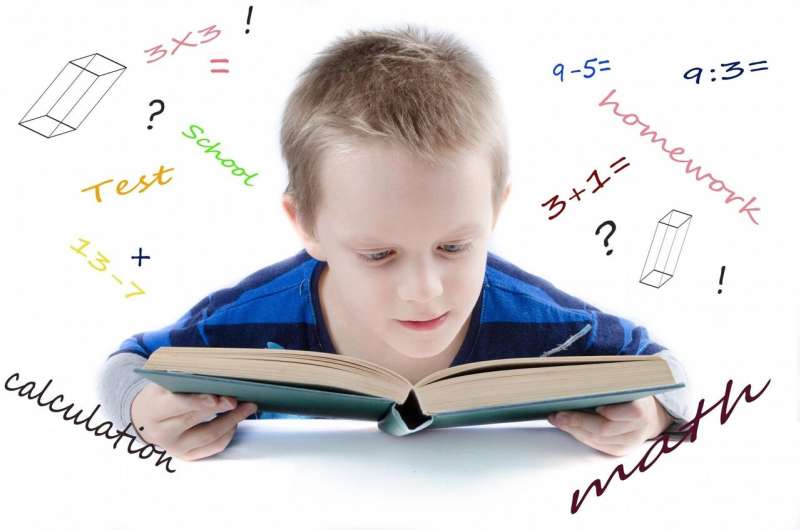Australia is failing at math and needs to find a new formula to arrest the decline
Divide, subtract, add, multiply: whatever way you cut it, Australia is heading in one direction when it comes to global math rankings—downwards.
From an OECD mathematics ranking of 11 in the world 20 years ago, Australian secondary students are now languishing in 29th place out of 38 countries, according to the most recent statistics.
The sliding math rankings have created widespread debate over whether curriculum changes are needed in our schools, but a new international paper co-authored by University of South Australia cognitive psychologist Dr. Fernando Marmolejo-Ramos could provide part of the solution.
In the latest edition of Integrative Psychology and Behavioral Science, Dr. Marmolejo-Ramos and researchers from China and Iran explain why simple gestures such as hand motions are important in helping students understand mathematical concepts.
“Many people struggle with mathematics and there is a lot of anxiety around it because it is an abstract topic,” Dr. Marmolejo-Ramos says. “You see the numbers, equations and graphs, but unless you engage human motor and sensory skills, they can be very difficult to grasp.”
To get math concepts across, it is important to bring together language, speech intonation, facial expressions and hand gestures, particularly the latter, the researchers say.
“Using your hands to create triangular, spherical, circular shapes and straight lines, reflecting the formulas you are trying to explain, is vital. It helps our brain better understand the concepts and commit them to memory.”
Gestures are body movements that are learnt from infancy, usually before speech, so they are ingrained in humans as a way of processing and acquiring new knowledge.
Dr. Marmolejo-Ramos says hand gestures are more relevant in teaching mathematics than other subjects because they engage our sensorimotor skills to help students interpret numbers more effectively.
The shift from face-to-face teaching towards online learning in the past two years due to the COVID-19 pandemic has made it even more challenging for math students, Dr. Marmolejo-Ramos says.
“When the only input you have is from a screen and a set of headphones, it is more difficult to use tools and gestures on screen. It’s not impossible, however, and if online learning is going to become more widespread, then hand gestures should be incorporated into the online teaching.”
“People struggle with mathematics for several reasons. It’s progressively demanding, but if you grasp the basics, the curve is not as steep.”
“Gestures Enhance Executive Functions for the Understanding of Mathematical Concepts” is published in Integrative Psychological and Behavioral Science.
Omid Khatin-Zadeh et al, Gestures Enhance Executive Functions for the Understating of Mathematical Concepts, Integrative Psychological and Behavioral Science (2022). DOI: 10.1007/s12124-022-09694-4
Citation:
Australia is failing at math and needs to find a new formula to arrest the decline (2022, May 18)
retrieved 18 May 2022
from https://phys.org/news/2022-05-australia-math-formula-decline.html
This document is subject to copyright. Apart from any fair dealing for the purpose of private study or research, no
part may be reproduced without the written permission. The content is provided for information purposes only.

Divide, subtract, add, multiply: whatever way you cut it, Australia is heading in one direction when it comes to global math rankings—downwards.
From an OECD mathematics ranking of 11 in the world 20 years ago, Australian secondary students are now languishing in 29th place out of 38 countries, according to the most recent statistics.
The sliding math rankings have created widespread debate over whether curriculum changes are needed in our schools, but a new international paper co-authored by University of South Australia cognitive psychologist Dr. Fernando Marmolejo-Ramos could provide part of the solution.
In the latest edition of Integrative Psychology and Behavioral Science, Dr. Marmolejo-Ramos and researchers from China and Iran explain why simple gestures such as hand motions are important in helping students understand mathematical concepts.
“Many people struggle with mathematics and there is a lot of anxiety around it because it is an abstract topic,” Dr. Marmolejo-Ramos says. “You see the numbers, equations and graphs, but unless you engage human motor and sensory skills, they can be very difficult to grasp.”
To get math concepts across, it is important to bring together language, speech intonation, facial expressions and hand gestures, particularly the latter, the researchers say.
“Using your hands to create triangular, spherical, circular shapes and straight lines, reflecting the formulas you are trying to explain, is vital. It helps our brain better understand the concepts and commit them to memory.”
Gestures are body movements that are learnt from infancy, usually before speech, so they are ingrained in humans as a way of processing and acquiring new knowledge.
Dr. Marmolejo-Ramos says hand gestures are more relevant in teaching mathematics than other subjects because they engage our sensorimotor skills to help students interpret numbers more effectively.
The shift from face-to-face teaching towards online learning in the past two years due to the COVID-19 pandemic has made it even more challenging for math students, Dr. Marmolejo-Ramos says.
“When the only input you have is from a screen and a set of headphones, it is more difficult to use tools and gestures on screen. It’s not impossible, however, and if online learning is going to become more widespread, then hand gestures should be incorporated into the online teaching.”
“People struggle with mathematics for several reasons. It’s progressively demanding, but if you grasp the basics, the curve is not as steep.”
“Gestures Enhance Executive Functions for the Understanding of Mathematical Concepts” is published in Integrative Psychological and Behavioral Science.
Omid Khatin-Zadeh et al, Gestures Enhance Executive Functions for the Understating of Mathematical Concepts, Integrative Psychological and Behavioral Science (2022). DOI: 10.1007/s12124-022-09694-4
Citation:
Australia is failing at math and needs to find a new formula to arrest the decline (2022, May 18)
retrieved 18 May 2022
from https://phys.org/news/2022-05-australia-math-formula-decline.html
This document is subject to copyright. Apart from any fair dealing for the purpose of private study or research, no
part may be reproduced without the written permission. The content is provided for information purposes only.
